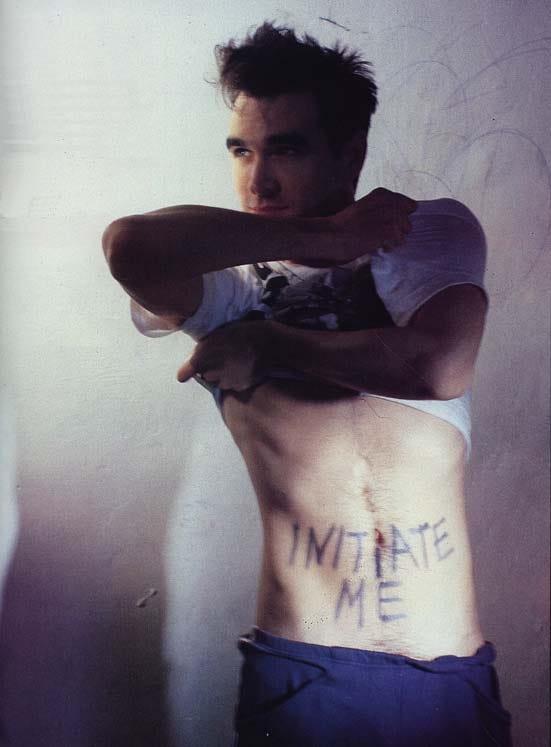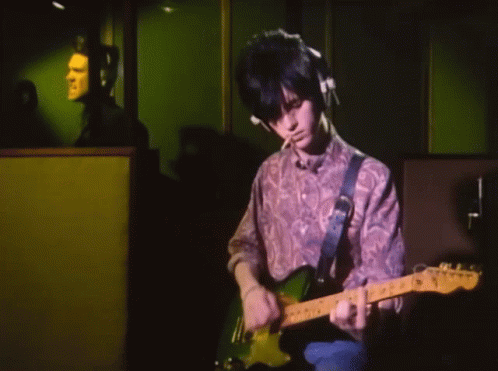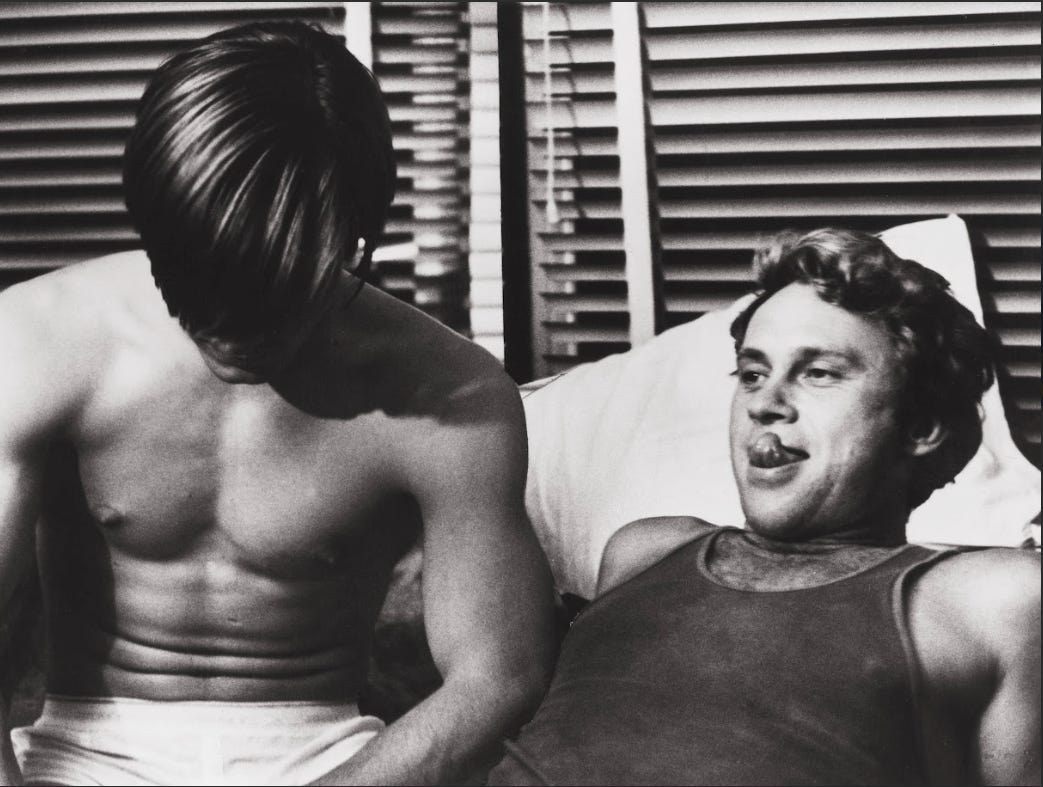"These Things Take Time" - The Smiths
On Unrequited Gay Love
Morrissey personified queer longing in a way that resonated with everyone and gave even the most masculine men permission to feel vulnerable.
“My eyes have seen the glory of the sacred wonderkind.
You took me behind a disused railway line.
And said, ‘I know a place where we can go where we are not known.’
And you gave me something that I won’t forget too soon.”
Inexperienced queer kid falls for closeted man, is used in secret, then tossed aside. Man retreats to heteronormative life.
This is the soap-opera-level shit that would fill volumes of diaries. Locked diaries.
There are thousands of songs about breakups, about heartache, or love lost.
But what matters is the one song that voices the secrets you’re keeping. The thoughts so hidden that, even in your own diary, the names are changed. It feels like the words tear at your psyche because they come from a place hidden by instinct, maybe for self-preservation. So how the hell could anyone sing your life when you wouldn’t dare whisper it out loud?
You turn on the radio…
“Pictures of You” by The Cure? That’s cute. Robert Smith’s brand of suffering is too romantic, too beautiful. It hasn’t steeped nearly long enough in shame.
“Love Will Tear Us Apart” by Joy Division? So serious. Can absolute hopelessness not have any humor at all?
“I Can’t Make You Love Me” by Bonnie Raitt — not quite as illustrative as “you took me behind a disused railway line…”
Enter, The Smiths. Nobody writes about unrequited love like Steven Patrick Morrissey. It’s as if your insecurities were handed a megaphone. Morrissey’s pain is your pain, except his pen has more flair:
“I’m spellbound, but a woman divides, and the hills are alive with celebate cries.”
Comparing sexual frustration to the nuns singing from the hilltops in The Sound of Music? Oscar Wilde would’ve tipped his hat.
And Morrisey would’ve loved that because “Keats and Yeats are on your side, while Wilde is on mine.” (“Cemetery Gates.”) Oscar Wilde sang Morrissey’s life, before Morrisey sang ours.
Like Wilde, Morrissey has an acute knack for turning agony poetic and hilarious.
“These Things Take Time” was the B-side to the successful single, “What Difference Does It Make.” And an argument could be made that Morrissey is singing about the same lover in both songs. Don’t tell his machismo fans, but Morrissey had clearly developed a deep connection to another man.
In “These Things Take Time,” Morrissey professes his feelings but is well aware that shame will never allow his lover to come out of the closet:
“But you know where you came from
You know where you're going
And you know where you belong.
You said I was ill, and you were not wrong.”
In “What Difference Does It Make,” Morrissey confesses that he’s grown tired of having feelings for this person, yet will never leave. “But still I’d leap in front of a flying bullet for you. So what difference does it make?”
If you take the morose lyrics by themselves, you’re tempted to gouge an eye out. This is what makes The Smiths as a band so brilliant. Johnny Marr, Morrissey’s songwriting partner and objectively one of the best guitarists of all time, is the perfect ying to Morrissey’s sad little yang. Johnny is stoic and cool and Steven is emotional and pleading. It’s sunglasses and cigarettes coupled with blouses and brooches.
This is your heart listening to The Smiths:
Morrissey and Marr were the Lennon/McCartney of the 1980s, although their creative approach was more about staying in your own talent-lane rather than melding styles. Marr, who possessed the singular talent of making his Rickenbacker guitar sound like an entire band, would record arrangements onto a cassette tape and give them to Morrissey to weave his poetry in between the notes. That’s why we get Morrissey’s signature looong notes. He was trying to fill space that already existed musically, and in turn, made the arrangement more interesting with his yearning vocalizations.
“Oh, the alcoholic afternoooons
When we sat in your roooom
They meant more to meee than any-eee,
Than any living thing on earrrth
They had more worth
Than any-eee living thing on ear-earth
On ear-eaaerth, on earth
Ooh, ooh, ooh, ooooooooooooooohhhooooooooooooooo oohhhhhhhhhhhhhhhoohhhhhhhhhhhhhhhhhhhhhh”
Morrissey chose the band’s name, “The Smiths,” because it was the most “ordinary” name he could think of, and “it’s time for ordinary folks to show their faces.” The irony, of course, was there’s nothing “ordinary” about Morrissey, at least by society’s standards in the 1980s.
Looking back today, it’s odd this was ever a band claimed by straight people.
Start with Morrissey’s obsessions with Oscar Wilde, James Dean, and Andy Warhol. Add his outright homosexual subject matter and lyrics (“This Charming Man,” “Paint a Vulgar Picture,” “I Want the One I Can’t Have” and don’t even start on his non-Smiths solo songs like “Piccadilly Palare,” which is literally about male prostitution). Then consider the album art that he hand-selected.
A crop from the Warhol film “Flesh” was the cover of The Smiths’ 1984 self-titled album. Their DEBUT ALBUM.
A still from another Warhol film, Women in Revolt, served as cover art for the single “Sheila Take a Bow.” This is a photo of transgender icon Candy Darling:
Topping Morrissey’s list of man-crushes was actor Dick Davalos, whose most famous role in the film “East of Eden” was as co-star (and *wink* roommate) with James Dean*.. Images of Davalos were the cover art on several albums.
None of these blatantly obvious homosexual themes ever deterred the scores of heterosexual men who swoon over Morrissey during live performances. Unlike the hormone-frenzied fangirls whose shrieks could deafen an arena at the sight of Elvis, The Beatles, or The Stones, it was mobs of hetero, cis men rushing the stage to hug and caress Morrissey. Straight men sob because his lyrics speak to what traditionalist masculinity doesn’t give them permission to feel.
In the press, Morrissey claimed celibacy (although he did come out as “huma-sexual” after disclosing a same-sex relationship in his 2013 autobiography). Perhaps that’s what made the sexual references palatable — or overlookable.
He sang queer pain, but it was that same agony that all young wannabe lovers feel. Anyone who saw themselves as an outsider -– the reclusive, the bookish, the awkward — they were all represented by the music of The Smiths.
And the music was damn good. Even though The Smiths were only a band for five years, there are very few clunkers. (Looking at you, “Golden Lights.”) You could throw a dart at almost any song and find lyrics that could crack you up or nail you to the floor for a good cry.
Exhibit A.
“I was looking for a job and then I found a job.
And Heaven knows I’m miserable now.”
Exhibit B.
“Driving in your car, Oh please don’t drop me home.
Because it’s not my home, it’s their home and I’m welcome no more.”
Thankfully, Johnny’s jingle jangle guitar kept us on our feet — most of the time.
It’s so easy when you know the rules. It’s so easy, all you have to do is…
Name the Smiths song that currently has the most streams on Spotify:
a) There is a Light That Never Goes Out
b) This Charming Man
c) How Soon is Now?
(Scroll to the bottom for the answer.)
Every week, we’ll spotlight one story from a reader about the song or music video that made them first have THOSE feelings. We all remember the moment that a song sparked a tingling sensation in our swimsuit area.
This week’s submission: “Physical” - Olivia Newton John
Submission: Amelia
Is it a good song? Absolutely not. Sexy lyrics? Not unless Harvey Weinstein speaks your love language. It begins:
I'm sayin' all the things that I know you'll like
Makin' good conversation
I gotta handle you just right
You know what I mean
But it wasn’t sung by a man. It was Olivia. And if I’m being honest, it’s the music video that made me squeal. What got me excited appeared, at first, a simple role reversal. Sandra Dee, the sweet turned sultry object of John Travolta’s desire from Grease, was now the one gazing…surrounded by middle aged “out of shape” men unable to operate a set of weights. It was very funny. Not because it objectified the men. Not because it celebrated the sexual empowerment of women. It did neither. What it did, for me, was open the fourth wall of exploitation and flicked it aside like an annoying fly. Though Olivia is adorned in full Jazzercise regalia, her movements remain almost mechanical, asexual. Rarely do we see her full body as the camera shifts between her face, HER gaze, and her collection of sexual objects of desire. Comical, silly, and absurd, the video took all the implicit rules of misogynistic sexual desire and said, “eew. Gross.” To seal the message, the story comes to an abrupt end as the men, now transformed from flab into pure beefcake, took hands with each other and snuck off to the shower room, leaving Liv and any fantasies of conquest dashed.
‘Twas magic.
Wanna submit a story about your sexual awakening? Submit your story or email songsthatsavedyou@gmail.com
And You’re A Material Girl
Welcome to our merch store! Every week, we’ll offer some cool swag based on the artist from each issue.
*Full disclosure: I do make money on the sales of these items. Your purchases help me pay to keep this publication running. 10% of all proceeds also go to the Dream Defenders, a non-profit organization dedicated to fighting the erasure of Black and queer rights in the state of Florida.
*(For further queer reference, check out this VERY homoerotic screen-test between Davalos and Dean, complete with an actual crotch grab.)
*Editor’s Note: It should be mentioned that Morrissey has become a trash human being. Never let your heroes grow old. If we separate the man he’s become now from the music forged during our formative years, the songs saved actual lives. That legacy is what we’re honoring here.
Quiz answer: “How Soon is Now?”
Did you catch last week’s issue?

















Impressive overview, Jami! I recognize that unmistakable torso on The Smiths' debut album! As Warhol once said, "In my movies, everyone's in love with Joe Dallesandro!" Well, he might not have been entirely correct, but he certainly wasn't wrong! While not on The Smiths myself, at the time, I was blown away by what Johnny and his Rick were able to pull off with PSB's Neil Tennant and New Order's Bernard Sumner to form Electronic in '89!
Last May, I highlighted their debut album: https://bradkyle.substack.com/p/audio-autopsy-1989-electronic-getting I hope you and your readers might enjoy...and, thanks!
I’m so happy to have discovered this stack today! What a fabulous exploration of a band that’s come to mean so much to me.
Love the selection of album covers you highlighted. Another to add to the mix, one of my favorites, is the cover for the This Charming Man single: a still from Cocteau’s Orphée, featuring the devastatingly handsome actor, and Cocteau’s longtime partner, Jean Marais. ❤️